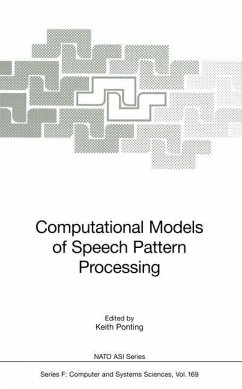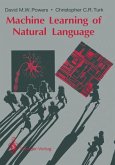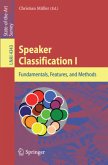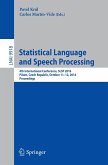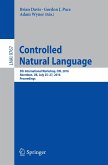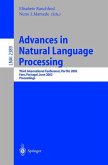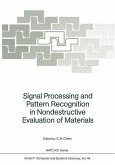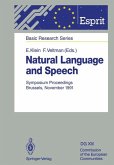Computational Models of Speech Pattern Processing
Herausgegeben:Ponting, Keith
Computational Models of Speech Pattern Processing
Herausgegeben:Ponting, Keith
- Broschiertes Buch
- Merkliste
- Auf die Merkliste
- Bewerten Bewerten
- Teilen
- Produkt teilen
- Produkterinnerung
- Produkterinnerung
Keith M. Ponting Speech Research Unit, DERA Malvern St. Andrew's Road, Great Malvern, Worcs. WR14 3PS, UK email: ponting
Andere Kunden interessierten sich auch für
![Machine Learning of Natural Language Machine Learning of Natural Language]() David M. W. PowersMachine Learning of Natural Language39,99 €
David M. W. PowersMachine Learning of Natural Language39,99 €![Speaker Classification I Speaker Classification I]() Christian Müller (ed.)Speaker Classification I38,99 €
Christian Müller (ed.)Speaker Classification I38,99 €![Statistical Language and Speech Processing Statistical Language and Speech Processing]() Statistical Language and Speech Processing32,99 €
Statistical Language and Speech Processing32,99 €![Controlled Natural Language Controlled Natural Language]() Controlled Natural Language32,99 €
Controlled Natural Language32,99 €![Advances in Natural Language Processing Advances in Natural Language Processing]() Elisabete Ranchod / Nuno J. Mamede (eds.)Advances in Natural Language Processing39,99 €
Elisabete Ranchod / Nuno J. Mamede (eds.)Advances in Natural Language Processing39,99 €![Signal Processing and Pattern Recognition in Nondestructive Evaluation of Materials Signal Processing and Pattern Recognition in Nondestructive Evaluation of Materials]() Signal Processing and Pattern Recognition in Nondestructive Evaluation of Materials77,99 €
Signal Processing and Pattern Recognition in Nondestructive Evaluation of Materials77,99 €![Natural Language and Speech Natural Language and Speech]() Natural Language and Speech77,99 €
Natural Language and Speech77,99 €-
-
-
Keith M. Ponting Speech Research Unit, DERA Malvern St. Andrew's Road, Great Malvern, Worcs. WR14 3PS, UK email: ponting
Produktdetails
- Produktdetails
- Nato ASI Subseries F: 169
- Verlag: Springer / Springer Berlin Heidelberg / Springer, Berlin
- Artikelnr. des Verlages: 978-3-642-64250-0
- Softcover reprint of the original 1st ed. 1999
- Seitenzahl: 484
- Erscheinungstermin: 21. Dezember 2011
- Englisch
- Abmessung: 235mm x 155mm x 27mm
- Gewicht: 727g
- ISBN-13: 9783642642500
- ISBN-10: 3642642500
- Artikelnr.: 36119512
- Herstellerkennzeichnung
- Springer-Verlag GmbH
- Tiergartenstr. 17
- 69121 Heidelberg
- ProductSafety@springernature.com
- Nato ASI Subseries F: 169
- Verlag: Springer / Springer Berlin Heidelberg / Springer, Berlin
- Artikelnr. des Verlages: 978-3-642-64250-0
- Softcover reprint of the original 1st ed. 1999
- Seitenzahl: 484
- Erscheinungstermin: 21. Dezember 2011
- Englisch
- Abmessung: 235mm x 155mm x 27mm
- Gewicht: 727g
- ISBN-13: 9783642642500
- ISBN-10: 3642642500
- Artikelnr.: 36119512
- Herstellerkennzeichnung
- Springer-Verlag GmbH
- Tiergartenstr. 17
- 69121 Heidelberg
- ProductSafety@springernature.com
Speech Pattern Processing.- Psycho-acoustics and Speech Perception.- Acoustic Modelling for Large Vocabulary Continuous Speech Recognition.- Tree-based Dependence Models for Speech Recognition.- Connectionist and Hybrid Models for Automatic Speech Recognition.- Computational Models for Auditory Speech Processing.- Speaker Adaptation of CDHMMs Using Bayesian Learning.- Discriminative Improvement of the Representation Space for Continuous Speech Recognition.- Dealing with Loss of Synchronism in Multi-Band Continuous Speech Recognition Systems.- K-Nearest Neighbours Estimator in a HMM-Based Recognition System.- Robust Speech Recognition.- Channel Adaptation.- Speaker Characterization, Speaker Adaptation and Voice Conversion.- Speaker Recognition.- Application of Acoustic Discriminative Training in an Ergodic HMM for Speaker Identification.- Comparison of Several Compensation Techniques for Robust Speaker Verification.- Segmental Acoustic Modeling for Speech Recognition.- Trajectory Representations and Acoustic Descriptions for a Segment-Modelling Approach to Automatic Speech Recognition.- Suprasegmental Modelling.- Computational Models for Speech Production.- Articulatory Features and Associated Production Models in Statistical Speech Recognition.- Talker Normalization with Articulatory Analysis-by-Synthesis.- The Psycholinguistics of Spoken Word Recognition.- Issues in Using Models for Self Evaluation and Correction of Speech.- The Use of the Maximum Likelihood Criterion in Language Modelling.- Language Model Adaptation.- Using Natural-Language Knowledge Sources in Speech Recognition.- How May I Help You?.- of Rules into a Stochastic Approach for Language Modelling.- History Integration into Semantic Classification.- Multilingual Speech Recognition.- Toward ALISP: A proposal for Automatic Language Independent Speech Processing.- Interactive Translation of Conversational Speech.- Multimodal Speech Systems.- Multimodal Interfaces for Multimedia Information Agents.
Speech Pattern Processing.- Psycho-acoustics and Speech Perception.- Acoustic Modelling for Large Vocabulary Continuous Speech Recognition.- Tree-based Dependence Models for Speech Recognition.- Connectionist and Hybrid Models for Automatic Speech Recognition.- Computational Models for Auditory Speech Processing.- Speaker Adaptation of CDHMMs Using Bayesian Learning.- Discriminative Improvement of the Representation Space for Continuous Speech Recognition.- Dealing with Loss of Synchronism in Multi-Band Continuous Speech Recognition Systems.- K-Nearest Neighbours Estimator in a HMM-Based Recognition System.- Robust Speech Recognition.- Channel Adaptation.- Speaker Characterization, Speaker Adaptation and Voice Conversion.- Speaker Recognition.- Application of Acoustic Discriminative Training in an Ergodic HMM for Speaker Identification.- Comparison of Several Compensation Techniques for Robust Speaker Verification.- Segmental Acoustic Modeling for Speech Recognition.- Trajectory Representations and Acoustic Descriptions for a Segment-Modelling Approach to Automatic Speech Recognition.- Suprasegmental Modelling.- Computational Models for Speech Production.- Articulatory Features and Associated Production Models in Statistical Speech Recognition.- Talker Normalization with Articulatory Analysis-by-Synthesis.- The Psycholinguistics of Spoken Word Recognition.- Issues in Using Models for Self Evaluation and Correction of Speech.- The Use of the Maximum Likelihood Criterion in Language Modelling.- Language Model Adaptation.- Using Natural-Language Knowledge Sources in Speech Recognition.- How May I Help You?.- of Rules into a Stochastic Approach for Language Modelling.- History Integration into Semantic Classification.- Multilingual Speech Recognition.- Toward ALISP: A proposal for Automatic Language Independent Speech Processing.- Interactive Translation of Conversational Speech.- Multimodal Speech Systems.- Multimodal Interfaces for Multimedia Information Agents.

